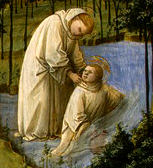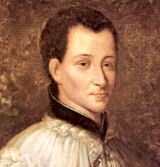One year ago today, on the the feast of Saints Maurus and Placid, I received three men and four women into the year of noviceship that has prepared them to become Oblates of our monastery. I also received two other men and one other woman in February. Investiture in the black Benedictine scapular and the imposition of a new name, placing the novice under the protection of a particular saint, marked the beginning of the noviceship. Following the lesson from Ecclesiasticus 2:1-21, I addressed them in these words, which I am happy to share again with the readers of Vultus Christi, one year later:
Newness of Life
My dear sons and daughters, a novice is one who is embarking on newness of life. My first word to you today, then, is an invitation to throw yourselves into the embrace of the One who says, "Behold, I make all things new" (Ap 21:5), our Lord Jesus Christ.
In the Likeness of the Son
One comes to the monastic life, be it as a monk or as an Oblate living in the world, in order to be refashioned in the likeness of the Beloved Son in whose image we were created. "But we all beholding the glory of the Lord with open face, are transformed into the same image from glory to glory, as by the Spirit of the Lord" (2 Cor 3:18).
Spiritual Childhood
One comes to the monastic life, be it as a monk or as an Oblate living in the world, to be made new again in the newness of the grace of Baptism; one comes to recover the innocence lost by sin, and to take one's first steps in the path of spiritual childhood, mindful of the word of the Lord: "Amen I say to you, unless you be converted, and become as little children, you shall not enter into the kingdom of heaven" (Mt 18:3).
Leaving Former Things Behind
One comes to the monastic life, be it as a monk or as an Oblate living in the world, desiring to leave behind those former things that made our lives burdensome to ourselves and to others, the things that clouded our spiritual vision, stopped up the ears of our hearts, and so congested our spiritual nostrils that we could barely, if at all, catch a whiff of what Saint Paul calls "the good fragrance of Christ unto God" (1 Cor 2:15).
A New Heart and a New Spirit
One comes to the monastic life, be it as a monk or as an Oblate living in the world, because one has grown weary of what is old, and stale, and lifeless, and because one believes in the promise of Him who says, through the mouth of His prophet, "And I will give you a new heart, and put a new spirit within you: and I will take away the stony heart out of your flesh, and will give you a heart of flesh" (Ex 36:26).
The Sweet Yoke of Christ
One comes to the monastic life, be it as a monk or as an Oblate living the world, because one has heard the invitation of the Heart of Jesus, "Come to me, all you that labour, and are burdened, and I will refresh you. Take up my yoke upon you, and learn of me, because I am meek, and humble of heart: and you shall find rest to your souls. For my yoke is sweet and my burden light" (Mt 11:28-30).
Christ's Oblation to the Father
One comes to the monastic life, be it as a monk or as an Oblate living the world, because Jesus has drawn one's soul into the upward movement of His oblation to the Father. "And I," says Our Lord, "if I be lifted up from the earth, will draw all things to myself" (Jn 12:32). Magnetized by the Cross and by the altar, one is compelled by the Holy Ghost to enter into the immolation of the Lamb. "Christ our Pasch is sacrificed. Therefore let us keep the feast" (1 Cor 5:6-7) by presenting "our bodies a living sacrifice, holy, pleasing unto God, our reasonable service" (Rom 12:1), that is, our mystic liturgy patterned after what God has revealed through His Word, our "adoration in spirit and in truth" (Jn 4:23).
In All of Life
The immolation of the Benedictine monk or Oblate, his participation in the victimhood of the Lamb, begins at the altar and returns to the altar, but it is played out in the most ordinary circumstances of daily life. For a monk, this encompasses his relationship to the Father of the monastery and to his brethren. For an Oblate, it encompasses one's relationship to one's spouse, one's children, one's grandchildren, and one's neighbours. It encompasses one's relationship to the guest who arrives announced or unannounced; one's relationship to the sick, the weak, and those in need of consolation, to little children to the elderly, the lonely and the poor. Finally, it encompasses the context of one's profession, employment, or state of life.
Never Despairing of the Mercy of God
There is nothing that cannot be brought to the altar. There is nothing that cannot be united to Christ's oblation. There are no circumstances in which we, monks and Oblates, are dispensed from owning our weaknesses, being humbled by our frailty, and uniting our wounds to the wounds, the weakness, and the frailty of the immolated Lamb -- and all of this, while never despairing of the mercy of God. This goes to the heart of what it means to be a Benedictine Oblate.
To be sure, one will also want to pray, insofar as possible, some parts of the Divine Office, the Opus Dei in communion with the choral prayer of the monks. One will want to open the ear of one's heart to the Word of God in lectio divina. One will want to adore the Eucharistic Face of Jesus, concealed and revealed in the Sacrament of His Love. One will want to cultivate a knowledge and holy enthusiasm for the Sacred Liturgy of the Church, for her Chant, her rites, her feasts, her fasts, and her seasons. In a word, one will want to submit to gentle yoke of the Rule of Saint Benedict, by receiving its wisdom, and by allowing it to shape the way one journeys through life, seeking God.
A Plan for the Noviceship
With all of this in mind, I am proposing a plan of study, reflection, and prayer in twelve points that will guide you through this year of your noviceship, and prepare you, by God's grace, for your Oblation in a year's time. Each of the twelve points corresponds to a month of your noviceship.
1. Listening With the Ear of the Heart
The first point has to do with learning to listen to the voice of God, to the gentle murmurings of the Holy Ghost, with the ear of your heart. Read and meditate the Prologue of the Holy Rule. In Luke 1:26-38 contemplate the Blessed Virgin Mary, the model of all fruitful listening. So well did Our Lady listen to the Word of God, that she conceived the Word in her virginal womb, and offered Him to the Father, and to us.
2. Obedience
The second point has to do with the practice of obedience, with learning to say "Yes" to God in all the circumstances of life, and with learning to say "No" to those things that pollute our minds, chill our hearts, and turn us aside from the royal way of the Cross, taken by Jesus before us. Read and meditate Philippians 2:5-15 and Chapter 5 of the Holy Rule.
3. Silence
The third point has to do with cultivating in us and around us the spirit of silence. It has to do with fasting from every form of speech that is self-serving, insincere, unkind, untrue, or lacking in mercy. It has to do with knowing how to abide in silence for God's sake, content to listen, to say nothing, to seek Him in faith, to desire Him with an irrepressible hope, and to cleave to Him in love. It has to do with moderation in the use of the tools of social communication, lest one become dependent on sounds and sights that distract us from The One Thing Necessary. For this you will want to meditate on Luke 10:38-42 and Chapter 6 of the Holy Rule.
4. Humility
The fourth point has to do with the practice of humility, with acknowledging and owning one's weaknesses, one's failures, and one's sins. It has to do with a willingness to learn from others who are wiser than ourselves, especially from the teachings of the Church, the writings of the saints, and from the whole monastic tradition. For this you will want to meditate Ecclesiasticus 2, Hebrews 11 and Chapter 7 of the Holy Rule.
5. The Divine Office
The fifth point has to do with the Divine Office and the Sacred Liturgy as a whole. You will apply yourself, before all else, to a sapiential knowledge of the Psalms. You will learn to find in them the very prayer inspired by the Holy Ghost and entrusted to Israel in view of the day when it would become the prayer of Jesus to the Father, the prayer that He bequeathed to His Bride, the Church. You will want meditate Christ in the Psalms by Father Patrick Reardon (Conciliar Press), The Spirit of the Liturgy by Pope Benedict XVI, and Chapters 19 and 20 of the Holy Rule.
6. Discipline and Penitence
The sixth point has to do with understanding the value of discipline and penitence, not as ends in themselves, still less as punitive practices, but as a means of growing in freedom of heart, and as the application of tried and tested spiritual remedies to the sin-sick soul. For this you will want to read the Seven Penitential Psalms (6, 31, 37, 50, 101, 129 and 142) and Chapters 23 through 30 of the Holy Rule.
7. Created Things
The seventh point has to do the practice of a responsible stewardship of material things. It has to so also with reverence for the good things created by God, seeing in all things matter with Eucharistic potential, matter to be lifted up and returned to the Father of lights from all good gifts descend. For this you will want to meditate Chapters 31 through 34 of the Holy Rule.
8. Hospitality
The eighth point has to do with gentleness, compassion and mercy, and with the recognition of the Face of Christ in the sick, in the old, in children, and in guests. It has to do also with the Benedictine tradition of hospitality by which all guests are welcomed as Christ Himself. For this you will want to meditate Chapters 36, 37, and 53 of the Holy Rule.
9. The Communion of the Saints
The ninth point has to do with the friendship of the saints who surround us like "a great cloud of witnesses over our head" (Heb 12:1), and who intercede for us in the glory of heaven. Consider Chapter 14 of the Holy Rule. Acquaint yourselves with the lives of Saint Benedict and Saint Scholastica, Saint Henry the Emperor and Saint Francesca of Rome, Saint Gertrude, Mother Mectilde de Bar, Blessed Columba Marmion, your patron saints as Oblates, and the other saints of our Benedictine family.
10. The Most Holy Sacrament of the Altar
The tenth point has to do with adoration of the Blessed Sacrament, for this is the distinctive charism of the Monastery of Our Lady of the Cenacle. It has to do with the quality and generosity of your response to Our Lord who waits for you in the Sacrament of His Love, who offers you His friendship, and who invites you to make reparation for those who do not believe in Him, do not hope in Him, do not love Him, and for those who have grown cold and indifferent to the mystery of His real presence in the tabernacles of our churches. For this you will want to meditate the teachings of Blessed John Paul II in Ecclesia de Eucharistia and in Mane Nobiscum Domine, the translated texts of Mother Mectilde de Bar, my own conference on Eucharistic Adoration given at Adoratio 2011 in Rome, and Chapter 52 of the Holy Rule.
11. The Instruments of Good Works
The eleventh point will be a summary of all the rest. You will meditate Chapter 4 of the Holy Rule, the Instruments of Good Works, dwelling on the most important one of all: Never to despair of God's Mercy.
12. A Benedictine Ethos in All of Life
The twelfth and last point will be the ethos of Benedictine life that you, as Oblates, will want to bring into every area of your lives. For this you will want to meditate Chapters 72 and 73 of the Holy Rule.
The Bond of the Oblation
I have spoken to you today, my dear sons and daughters, as a father who loves you in Christ and who desires, above all else, that you may, as Saint Benedict says, "run, with expanded hearts in the way of God's commandments, with an unspeakable sweetness of love." The bond that your Oblation will establish between yourselves and us will be, I am certain, a consolation here on earth, and a cause of thanksgiving and praise forever in heaven.




 St. Paul is called "the first hermit" in the Missal and Breviary, a rare distinction, for such titles are seldom appended. Our saint was the standard-bearer of those courageous men who for the love of Christ left the world and entered the wilderness to dedicate themselves wholly to contemplation amid all the privations of desert life. The hermits were the great men of prayer in those difficult times when the Church was locked in fierce struggle with heresy after heresy. For centuries the example of their lives served as the school of Christian perfection. Their action set the background for the rise of monasticism and religious orders in the Church.
St. Paul is called "the first hermit" in the Missal and Breviary, a rare distinction, for such titles are seldom appended. Our saint was the standard-bearer of those courageous men who for the love of Christ left the world and entered the wilderness to dedicate themselves wholly to contemplation amid all the privations of desert life. The hermits were the great men of prayer in those difficult times when the Church was locked in fierce struggle with heresy after heresy. For centuries the example of their lives served as the school of Christian perfection. Their action set the background for the rise of monasticism and religious orders in the Church.  In Benedictine history Maurus holds a distinguished place, taught and trained by St. Benedict himself. While still very young, Maurus and another youth, Placid, were brought by their parents to be reared in monastic life by the Patriarch of Monks. An incident reveals Maurus' spirit of childlike obedience. One day Placid was sent to a near-by lake to draw water. Soon he was at the shore, where, boy that he was, he fell victim to his own heedlessness. Eager to fill the vessel quickly, he reached out too far and was dragged in by the rapidly filling jar. He was being borne along by the waves when from his cell St. Benedict realized what had happened. "Hurry, run to the lake! Placid has fallen in!" he called to Maurus. Stopping only for his spiritual father's blessing, Maurus sped to the lake, seized Placid by the hair and brought him ashore.
In Benedictine history Maurus holds a distinguished place, taught and trained by St. Benedict himself. While still very young, Maurus and another youth, Placid, were brought by their parents to be reared in monastic life by the Patriarch of Monks. An incident reveals Maurus' spirit of childlike obedience. One day Placid was sent to a near-by lake to draw water. Soon he was at the shore, where, boy that he was, he fell victim to his own heedlessness. Eager to fill the vessel quickly, he reached out too far and was dragged in by the rapidly filling jar. He was being borne along by the waves when from his cell St. Benedict realized what had happened. "Hurry, run to the lake! Placid has fallen in!" he called to Maurus. Stopping only for his spiritual father's blessing, Maurus sped to the lake, seized Placid by the hair and brought him ashore.  Missionary and ascetical writer, born of noble parentage at Saint-Symphorien-d'Ozon, between Lyons and Vienne, in 1641; died at Paray-le-Monial, 15 February, 1682. He entered the Society of Jesus in 1659. After fifteen years of religious life he made a vow, as a means of attaining the utmost possible perfection, to observe faithfully the rule and constitutions of his order under penalty of sin. Those who lived with him attested that this vow was kept with great exactitude. In 1674 Father de la Colombière was made superior at the Jesuit house at Paray-le-Monial, where he became the spiritual director of Blessed Margaret Mary and was thereafter a zealous apostle of the devotion to the Sacred Heart of Jesus. In 1676 he was sent to England as preacher to the Duchess of York, afterwards Queen of Great Britain. He lived the life of a religious even in the Court of St. James and was as active a missionary in England as he had been in France. Although encountering many difficulties, he was able to guide Blessed Margaret Mary by letter. His zeal soon weakened his vitality and a throat and lung trouble seemed to threaten his work as a preacher. While awaiting his recall to France he was suddenly arrested and thrown into prison, denounced as a conspirator. Thanks to his title of preacher to the Duchess of York and to the protection of Louis XIV, whose subject he was, he escaped death but was condemned to exile (1679). The last two years of his life were spent at Lyons where he was spiritual director to the young Jesuits, and at Paray-le-Monial, whither he repaired for his health. His principal works, including "Pious Reflections", "Meditations on the Passion", "Retreat and Spiritual Letters", were published under the title, "Oeuvres du R. P. Claude de la Colombière" (Avignon, 1832; Paris, 1864). His relics are preserved in the monastery of the Visitation nuns at Paray-le-Monial. (Catholic Encyclopedia) He was canonized by Pope John Paul II on May 31, 1992.
Missionary and ascetical writer, born of noble parentage at Saint-Symphorien-d'Ozon, between Lyons and Vienne, in 1641; died at Paray-le-Monial, 15 February, 1682. He entered the Society of Jesus in 1659. After fifteen years of religious life he made a vow, as a means of attaining the utmost possible perfection, to observe faithfully the rule and constitutions of his order under penalty of sin. Those who lived with him attested that this vow was kept with great exactitude. In 1674 Father de la Colombière was made superior at the Jesuit house at Paray-le-Monial, where he became the spiritual director of Blessed Margaret Mary and was thereafter a zealous apostle of the devotion to the Sacred Heart of Jesus. In 1676 he was sent to England as preacher to the Duchess of York, afterwards Queen of Great Britain. He lived the life of a religious even in the Court of St. James and was as active a missionary in England as he had been in France. Although encountering many difficulties, he was able to guide Blessed Margaret Mary by letter. His zeal soon weakened his vitality and a throat and lung trouble seemed to threaten his work as a preacher. While awaiting his recall to France he was suddenly arrested and thrown into prison, denounced as a conspirator. Thanks to his title of preacher to the Duchess of York and to the protection of Louis XIV, whose subject he was, he escaped death but was condemned to exile (1679). The last two years of his life were spent at Lyons where he was spiritual director to the young Jesuits, and at Paray-le-Monial, whither he repaired for his health. His principal works, including "Pious Reflections", "Meditations on the Passion", "Retreat and Spiritual Letters", were published under the title, "Oeuvres du R. P. Claude de la Colombière" (Avignon, 1832; Paris, 1864). His relics are preserved in the monastery of the Visitation nuns at Paray-le-Monial. (Catholic Encyclopedia) He was canonized by Pope John Paul II on May 31, 1992.  Devotion to Our Lady of Prompt Succor dates back to 1802, when the Ursuline Order in New Orleans pleaded for help in sustaining the Order with new sisters from France. Their prayers were answered with papal permission for sisters to be transferred from France to New Orleans. In thanksgiving for this favor, the Ursulines dedicated a statue in their convent chapel to Our Lady of Prompt Succor in 1810.
Devotion to Our Lady of Prompt Succor dates back to 1802, when the Ursuline Order in New Orleans pleaded for help in sustaining the Order with new sisters from France. Their prayers were answered with papal permission for sisters to be transferred from France to New Orleans. In thanksgiving for this favor, the Ursulines dedicated a statue in their convent chapel to Our Lady of Prompt Succor in 1810. 
